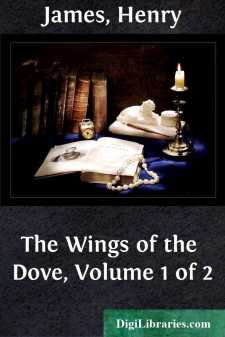Categories
- Antiques & Collectibles 13
- Architecture 36
- Art 48
- Bibles 22
- Biography & Autobiography 813
- Body, Mind & Spirit 142
- Business & Economics 28
- Children's Books 14
- Children's Fiction 11
- Computers 4
- Cooking 94
- Crafts & Hobbies 4
- Drama 346
- Education 46
- Family & Relationships 57
- Fiction 11829
- Games 19
- Gardening 17
- Health & Fitness 34
- History 1377
- House & Home 1
- Humor 147
- Juvenile Fiction 1873
- Juvenile Nonfiction 202
- Language Arts & Disciplines 88
- Law 16
- Literary Collections 686
- Literary Criticism 179
- Mathematics 13
- Medical 41
- Music 40
- Nature 179
- Non-Classifiable 1768
- Performing Arts 7
- Periodicals 1453
- Philosophy 64
- Photography 2
- Poetry 896
- Political Science 203
- Psychology 42
- Reference 154
- Religion 513
- Science 126
- Self-Help 84
- Social Science 81
- Sports & Recreation 34
- Study Aids 3
- Technology & Engineering 59
- Transportation 23
- Travel 463
- True Crime 29
Henry James
Henry James (1843-1916) was an American author known for his contributions to 19th-century literary realism and modernism. His works often explore themes of consciousness and perception, with notable novels including "The Portrait of a Lady," "The Turn of the Screw," and "The Wings of the Dove." James is celebrated for his intricate prose style and deep psychological insight into his characters.
Author's Books:
Sort by:
by:
Henry James
LOUIS AGASSIZ[1] It would be unnatural to have such an assemblage as this meet in the Museum and Faculty Room of this University and yet have no public word spoken in honor of a name which must be silently present to the minds of all our visitors. At some near future day, it is to be hoped some one of you who is well acquainted with Agassiz's scientific career will discourse here concerning...
more...
by:
Henry James
I had taken Mrs. Prest into my confidence; in truth without her I should have made but little advance, for the fruitful idea in the whole business dropped from her friendly lips. It was she who invented the short cut, who severed the Gordian knot. It is not supposed to be the nature of women to rise as a general thing to the largest and most liberal view—I mean of a practical scheme; but it has...
more...
by:
Henry James
I The view from the terrace at Saint-Germain-en-Laye is immense and famous. Paris lies spread before you in dusky vastness, domed and fortified, glittering here and there through her light vapours and girdled with her silver Seine. Behind you is a park of stately symmetry, and behind that a forest where you may lounge through turfy avenues and light-chequered glades and quite forget that you are within...
more...
by:
Henry James
CHAPTER I. He had a mortal dislike, poor Stransom, to lean anniversaries, and loved them still less when they made a pretence of a figure. Celebrations and suppressions were equally painful to him, and but one of the former found a place in his life. He had kept each year in his own fashion the date of Mary Antrim’s death. It would be more to the point perhaps to say that this occasion kept...
more...
by:
Henry James
I If the author of this meandering record has noted elsewhere that an event occurring early in 1870 was to mark the end of his youth, he is moved here at once to qualify in one or two respects that emphasis. Everything depends in such a view on what one means by one's youth—so shifting a consciousness is this, and so related at the same time to many different matters. We are never old, that is...
more...
by:
Henry James
IT was an occasion, I felt—the prospect of a large party—to look out at the station for others, possible friends and even possible enemies, who might be going. Such premonitions, it was true, bred fears when they failed to breed hopes, though it was to be added that there were sometimes, in the case, rather happy ambiguities. One was glowered at, in the compartment, by people who on the morrow,...
more...
by:
Henry James
"I say, you know, Kate—you did stay!" had been Merton Densher's punctual remark on their adventure after they had, as it were, got out of it; an observation which she not less promptly, on her side, let him see that she forgave in him only because he was a man. She had to recognise, with whatever disappointment, that it was doubtless the most helpful he could make in this character. The...
more...
by:
Henry James
THE WINGS OF THE DOVE She waited, Kate Croy, for her father to come in, but he kept her unconscionably, and there were moments at which she showed herself, in the glass over the mantel, a face positively pale with the irritation that had brought her to the point of going away without sight of him. It was at this point, however, that she remained; changing her place, moving from the shabby sofa to the...
more...
by:
Henry James
I "I guess my daughter's in here," the old man said leading the way into the little salon de lecture. He was not of the most advanced age, but that is the way George Flack considered him, and indeed he looked older than he was. George Flack had found him sitting in the court of the hotel—he sat a great deal in the court of the hotel—and had gone up to him with characteristic directness...
more...
by:
Henry James
PREFACE "The Portrait of a Lady" was, like "Roderick Hudson," begun in Florence, during three months spent there in the spring of 1879. Like "Roderick" and like "The American," it had been designed for publication in "The Atlantic Monthly," where it began to appear in 1880. It differed from its two predecessors, however, in finding a course also open to it, from...
more...











